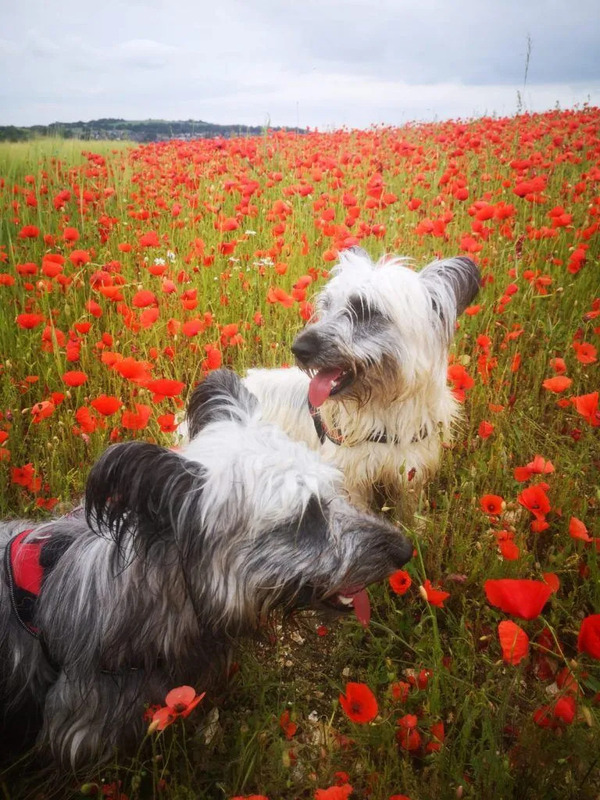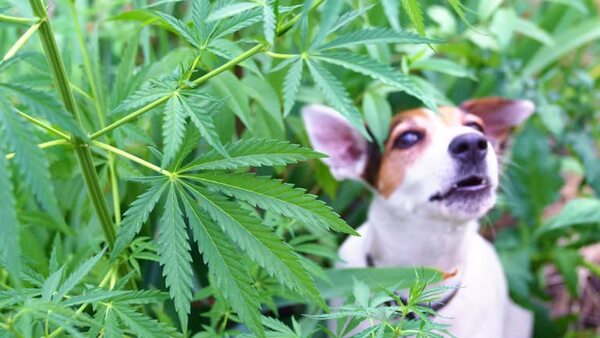As dog owners, we always want to keep our pets safe and healthy, which means being mindful of the foods and substances that could harm them. Poppy seeds and marijuana are two items that may seem harmless at first, but they can be dangerous to our furry friends. In this article, we'll explore whether poppy seeds and marijuana are bad for dogs, how they affect dogs differently, and what to do if your dog consumes them.
Poppy seeds come from the poppy plant, and they’re commonly used in foods like muffins, bagels, and salad dressings. While they are generally safe for humans, you might wonder if they are safe for dogs.
Yes, poppy seeds can be harmful to dogs if consumed in large amounts. Poppy seeds contain trace amounts of opiates, including morphine and codeine, which are substances that can affect a dog’s central nervous system. While the amount of opiates in poppy seeds is usually too small to harm humans, dogs are much more sensitive to these substances. Even small amounts of poppy seeds could cause an adverse reaction in some dogs.
If a dog eats poppy seeds, they may experience:
Drowsiness or lethargy
Vomiting
Diarrhea
Drooling
Uncoordinated movement or difficulty walking
Slow heart rate or breathing problems
If you suspect your dog has eaten a significant amount of poppy seeds, it’s important to contact your vet immediately.

Poppy flowers (specifically, the Papaver somniferum variety, which includes the opium poppy) are generally not safe for dogs. While the flowers themselves are not typically toxic in the same way that the seeds or other parts of the plant are, the entire plant contains compounds, particularly alkaloids like morphine and codeine, that can be harmful to dogs if ingested or if they come into contact with them in certain ways.
Toxicity:
The main concern with poppy flowers and plants is their alkaloid content. While the seeds in poppies are generally safe in small amounts when used in food for humans (due to processing), the plant itself, including the flowers, stems, leaves, and pods, can contain morphine and codeine. These substances can have sedative effects and are toxic to dogs, especially if ingested. Even small amounts of the plant can lead to poisoning.
Symptoms of Poisoning:
If a dog eats or chews on any part of a poppy plant, the symptoms of poisoning might include:
Lethargy or excessive sleepiness
Slow or irregular heart rate
Difficulty breathing
Drooling
Vomiting
Dilated pupils
Coordination problems or walking difficulties
Severe cases can lead to coma or even death.
Exposure to Pollens:
While the primary risk is from ingestion, direct exposure to pollen or brushing against poppy flowers may also cause mild irritation in some dogs, especially if they have sensitive skin or allergies. However, this is far less dangerous than ingestion of the plant material.
It is best to keep dogs away from poppy plants and flowers to prevent any potential harm. If you have poppies in your garden or home and a dog around, you should ensure that the dog cannot access the plants. This is particularly important if the dog is prone to chewing on plants or flowers, as they may mistakenly chew on the poppies, which could lead to poisoning.
If you suspect that your dog has ingested any part of a poppy plant, it's important to contact a veterinarian immediately. The vet may induce vomiting, administer activated charcoal to absorb toxins, or provide other supportive treatments, such as intravenous fluids to help flush the toxins out of the dog's system.
Poppy flowers and plants are not safe for dogs due to their alkaloid content. Keeping your dog away from them and ensuring that they do not chew or eat any part of the plant is essential to their safety. If you suspect your dog has ingested poppy plant material, seek veterinary care right away.
Marijuana, also known as cannabis, contains chemicals called cannabinoids, including THC (tetrahydrocannabinol), which are responsible for the plant’s psychoactive effects. While marijuana is legal in some areas for human use, it can be extremely dangerous to dogs. Dogs do not metabolize THC the same way humans do, which makes them more susceptible to its harmful effects.

Yes, marijuana is toxic to dogs. Even though marijuana is often seen as a "natural" product for humans, it can cause serious health issues for pets. Dogs are much more sensitive to THC, and ingesting even small amounts of marijuana can cause serious side effects.
If a dog consumes marijuana, they may show signs of toxicity, including:
Lethargy or drowsiness
Lack of coordination or stumbling
Dilated pupils
Drooling or foaming at the mouth
Vomiting
Slow heart rate
Tremors or seizures
Loss of bladder control
In severe cases, marijuana poisoning can lead to coma or death, especially if the dog has ingested a large amount. If you suspect your dog has eaten marijuana, contact your vet right away for immediate care.
Dogs are more sensitive to certain substances like opiates (found in poppy seeds) and THC (found in marijuana) because their bodies process these chemicals differently than humans. Dogs have a higher number of cannabinoid receptors in their brains, making them more vulnerable to marijuana’s effects. Their liver is also less efficient at breaking down these chemicals, so they can stay in their system longer and cause more severe reactions.
It’s hard to pinpoint exactly how many poppy seeds would cause harm to a dog, as it depends on the size of the dog, their sensitivity, and the amount ingested. However, it’s generally advisable to keep all foods with poppy seeds away from your pets. Small dogs are especially at risk, as even a small amount could lead to toxicity.
Even small amounts of marijuana can be dangerous to dogs. For example, ingesting a single edible (like a brownie or cookie) that contains THC could cause severe symptoms in a dog. The toxicity can be even greater if the dog consumes marijuana in a concentrated form, such as oil or tinctures.
If you suspect your dog has eaten poppy seeds or marijuana, follow these steps:
Call your vet immediately: Time is of the essence. The vet will be able to assess the situation and advise you on the best course of action. They may ask for details like the amount of the substance consumed and your dog’s size and health history.
Do not induce vomiting unless instructed: Some substances can cause more harm when brought back up. Your vet will advise if vomiting is necessary.
Follow your vet’s instructions: Your vet may recommend bringing your dog in for treatment, which could include inducing vomiting, administering activated charcoal to absorb toxins, or providing intravenous fluids to prevent dehydration and flush out the toxins.

The best way to prevent poisoning is to keep poppy seeds and marijuana completely out of reach of your dog. Here are some tips:
Avoid leaving food unattended: If you're baking with poppy seeds or consuming marijuana products, keep them away from your pet.
Store marijuana safely: Keep marijuana and its products, such as edibles, oils, or tinctures, in a locked, secure cabinet or drawer.
Educate others: Make sure anyone who interacts with your dog knows the dangers of poppy seeds and marijuana.
While poppy seeds and marijuana might seem harmless to humans, they can be very dangerous to dogs. Poppy seeds can contain opiates that affect a dog’s nervous system, while marijuana contains THC, which can cause severe poisoning. If your dog accidentally eats these substances, it’s important to seek veterinary care immediately.
As a pet owner, your best defense is prevention: keep these harmful substances out of your dog's reach and ensure that all household members are aware of the risks. By staying vigilant, you can protect your furry friend from harm and ensure they live a long, happy life.
Poppy seeds, in their typical culinary form, are not psychoactive. Although they come from the same plant (Papaver somniferum) that produces opium, the seeds themselves contain only trace amounts of the alkaloids (such as morphine and codeine) found in other parts of the plant, like the pods and flowers. The levels of these compounds in poppy seeds are extremely low, and they are not enough to produce any psychoactive or intoxicating effects.
Low Alkaloid Content:
Poppy seeds do contain very small amounts of opiate alkaloids, but the concentration is so low that it doesn't have a noticeable effect on the body. The seeds are harvested after the pods are dried and typically washed thoroughly before they reach consumers, which helps reduce any residual morphine or codeine.
Processing:
Most commercially available poppy seeds, especially those used in cooking and baking, are processed to minimize any trace amounts of opiate compounds. The cleaning and washing processes that poppy seeds go through before being packaged for consumption ensure that the amount of psychoactive substances is negligible.
Not Enough to Cause Intoxication:
Even if you were to consume a large quantity of poppy seeds, the amount of morphine and codeine you'd ingest is still too low to produce psychoactive effects. It's important to note that the opiate effects of morphine and codeine are only felt in larger doses, typically from consuming other parts of the poppy plant (like the pods), not from seeds.
While poppy seeds are not psychoactive, they can potentially affect drug tests. This is because the morphine and codeine that are present in poppy seeds, though in very small quantities, can sometimes show up in urine drug tests. However, the trace amounts from eating poppy seeds are far lower than the amounts that would cause intoxication or addiction.
Some individuals who have eaten large amounts of poppy seeds (for example, a poppy seed bagel or muffin) may test positive for morphine on a drug test, even though they haven't used illicit drugs. This is one of the reasons why many drug testing organizations recommend avoiding poppy seeds before taking a test.
Poppy seeds are not psychoactive in normal amounts and are generally considered safe for human consumption as a food ingredient. The trace alkaloids they contain are too low to cause any intoxicating or mind-altering effects. However, they can interfere with drug tests due to the presence of morphine and codeine. If you're concerned about drug testing or potential side effects, it's best to limit or avoid poppy seeds before a test.
animal tags: Poppy-Seeds Marijuana Dogs
We created this article in conjunction with AI technology, then made sure it was fact-checked and edited by a Animals Top editor.